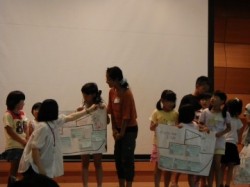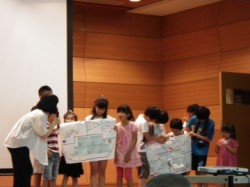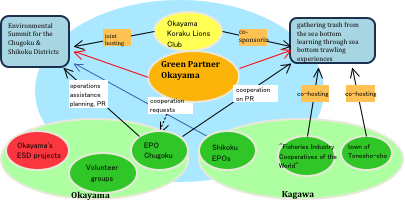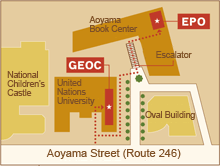Summary
Large amounts of everyday trash, apparently carried in via Okayama’s rivers, had resulted in approximately 13,000 tons or more of rubbish accumulating on the sea floor. This was viewed as one cause of significant drops in the number of fish species and the volumes of fish caught in the Seto Inland Sea. So the incorporated NPO Green Partner Okayama raised its voice, and began working towards the recovery of the Seto Inland Sea, getting the private sector and fisheries cooperatives involved.
Utilizing sea bottom trawling, in May, 2013, on-site training in trash collection, and separation of the trash for analysis, was carried out offshore near the town of Tonosho-cho in Shodo County, Kagawa Prefecture. Participants were recruited from both Okayama and Kagawa prefectures. Then, in June, over a two-day period, the Environmental Summit for the Chugoku & Shikoku Districts was held. By means of symposiums and presentations of case studies, more people were made aware of the problems faced, which reconfirmed the importance of continuing efforts and taking action.
EPO (Environmental Partnership Office) Chugoku, having received a request for cooperation through its counseling services, and due to the understanding that a broad-based, collaborative effort was needed to deal with the trash problem in the Seto Inland Sea, lent its support in the areas of project planning, public relations cooperation, assistance with operations, etc.
 |
 |
Points about the partnership
- Focusing attention on how the trash on the sea bottom was negatively affecting the fishing industry, and also getting the cooperation of fisheries cooperatives, they were able to inform participants about the real situation;
- The actor had the objective of connecting “mountain areas & coastal areas”, as well as “fishermen & residents”, by means of cleanup activities and symposiums. It worked exhaustively to improve understanding of the actual situation, and mutual understanding;
- The rubbish problem in the Seto Inland Sea requires collaboration not only with the Chugoku district, but also with the Shikoku district; therefore, the plan is to move forward with cooperative efforts with EPOs from Shikoku.
Category
Project cooperation/project accord
Theme
Waste/’3R’ principles (reduce/reuse/ recycle) / resource cycles
Actor
Green Partner Okayama (incorporated NPO)
Partner
Okayama Koraku Lions Club, “Fisheries Industry Cooperatives of the World”, EPO Chugoku, Okayama Koraku LEO Club (= Lions Club youth education programs)
Reference
Green Partner Okayama participates in Okayama’s ESD (education for sustainable development) projects, and carries out activities together with people in government, universities and schools, citizens in general, and others.


















